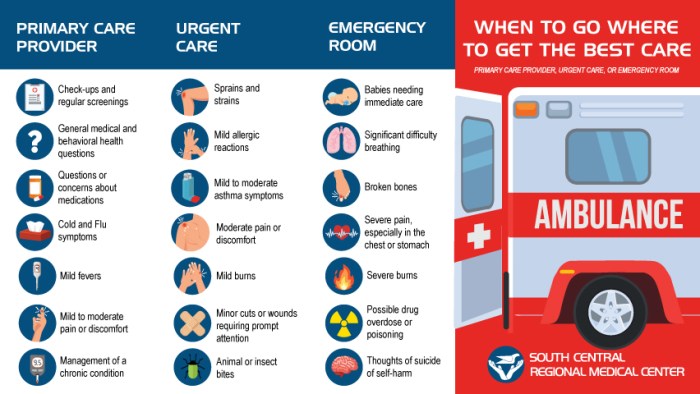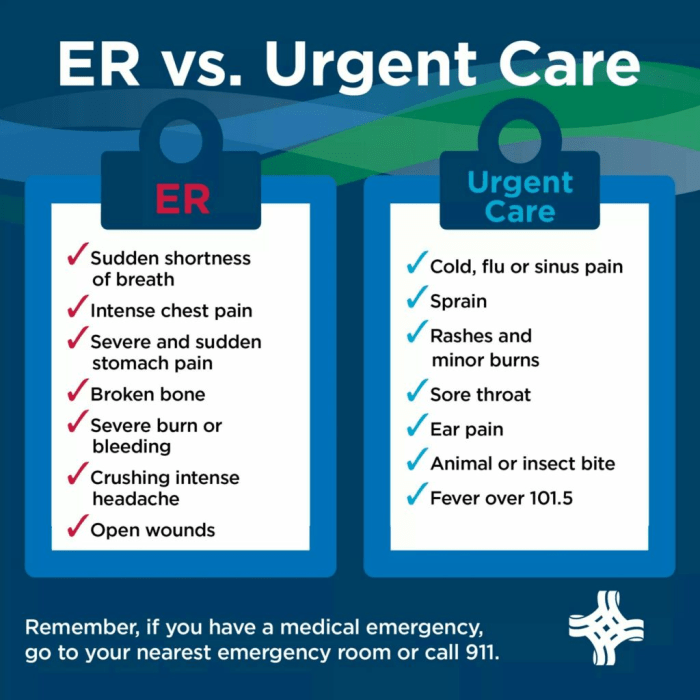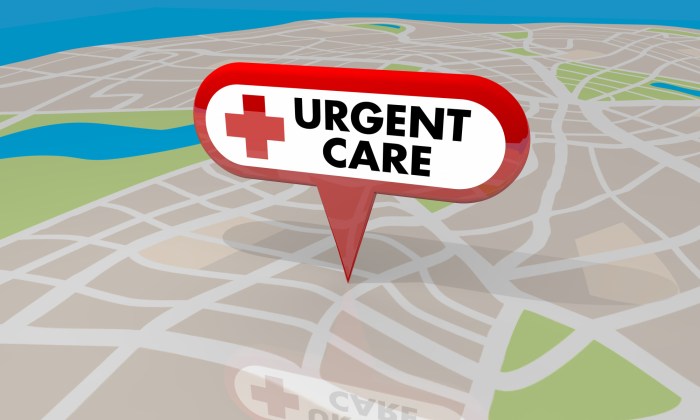When is the best time to go to urgent care? This question arises when faced with non-life-threatening medical situations. Urgent care facilities offer prompt medical attention for a range of illnesses and injuries, but understanding the appropriate time to visit is crucial.
This guide will explore the factors to consider when determining the optimal time to seek urgent care, ensuring you receive timely and effective medical attention.
Common Reasons to Visit Urgent Care: When Is The Best Time To Go To Urgent Care

Urgent care centers are designed to provide quick and convenient medical attention for a wide range of non-life-threatening injuries and illnesses.
Here are some of the most common reasons people visit urgent care:
Minor Injuries
- Cuts and lacerations
- Bruises and sprains
- Minor burns
- Broken bones
Illnesses
- Colds and flu
- Sore throats
- Ear infections
- Urinary tract infections
Infections
- Skin infections
- Eye infections
- Respiratory infections
- Gastrointestinal infections
Hours of Operation and Availability

Urgent care facilities typically operate during extended hours, including evenings and weekends, to accommodate patients with non-emergency medical needs. The specific hours of operation may vary depending on the location and provider, but many urgent care centers offer services from early morning until late evening, seven days a week.
Weekends and Holidays, When is the best time to go to urgent care
Urgent care centers are often open on weekends and holidays, providing convenient access to medical care during these times. This can be particularly beneficial for individuals who experience medical issues outside of regular business hours or who need immediate attention but do not require emergency room services.
Extended Hours and 24/7 Availability
Some urgent care centers offer extended hours or even 24/7 availability to cater to patients with urgent medical needs at any time of day or night. These centers are often located in areas with high demand for medical services or in communities where access to healthcare may be limited.
To find urgent care centers with extended hours or 24/7 availability, patients can search online directories, consult with their healthcare providers, or contact local medical facilities directly for information on their hours of operation.
Urgent Care vs. Emergency Room
Urgent care centers and emergency rooms are both healthcare facilities that provide medical care, but they differ in their scope of services, wait times, and costs.
Urgent care centers are typically open during extended hours and offer walk-in appointments for non-life-threatening conditions, such as sprains, minor cuts, and infections. They typically have shorter wait times than emergency rooms and offer a more convenient option for patients who need immediate medical attention but do not require emergency care.
While it’s important to know when it’s the best time to go to urgent care, it’s equally crucial to understand how to get back on track after a gastric sleeve procedure. This can involve following a specific diet, managing hunger, and addressing any complications.
For comprehensive guidance on this topic, refer to our article: How to Get Back on Track After Gastric Sleeve . Returning to the subject of urgent care, it’s always advisable to seek medical attention promptly in case of any concerning symptoms or injuries.
When to Visit Urgent Care
- Minor injuries, such as sprains, strains, and cuts
- Minor illnesses, such as colds, flu, and urinary tract infections
- Skin rashes and infections
- Eye infections and injuries
- Minor burns
When to Seek Emergency Medical Attention
- Chest pain or shortness of breath
- Sudden onset of severe pain
- Head injury with loss of consciousness
- Stroke symptoms, such as sudden weakness or numbness on one side of the body
- Seizures
- Severe bleeding
- Poisoning
Choosing the Right Urgent Care Center
When selecting an urgent care center, several factors should be considered to ensure you receive the best possible care:
Location and Accessibility
Choose a center conveniently located for easy access in case of emergencies. Consider factors like proximity to your home or workplace, traffic conditions, and parking availability.
Insurance Coverage
Verify if the urgent care center accepts your insurance plan. Contact your insurance provider or check the center’s website for information on accepted plans and potential out-of-pocket costs.
Urgent care is most helpful when you need prompt medical attention for minor injuries or illnesses. If you’re experiencing severe pain, you may wonder if you need a referral to see a pain management doctor. Check with your insurance provider to confirm their requirements.
Regardless, urgent care can provide immediate relief for acute pain while you navigate the process of scheduling an appointment with a pain management specialist.
Patient Reviews
Read online reviews from previous patients to gain insights into the quality of care, wait times, and overall patient experience. Positive reviews indicate a reputable and reliable facility.
Hours of Operation
Ensure the center’s hours of operation align with your potential needs. Some centers may have extended hours or even 24/7 availability, which is beneficial for after-hours emergencies.
Reputation and Experience
Consider the center’s reputation within the community and the experience of its healthcare providers. Check for any certifications or accreditations that demonstrate adherence to quality standards.
Additional Services
Some urgent care centers offer additional services such as X-rays, lab tests, or vaccinations. If you anticipate needing these services, inquire about their availability.
Comfort and Amenities
While medical care is the priority, a comfortable and welcoming environment can enhance your experience. Consider the center’s cleanliness, seating arrangements, and amenities such as Wi-Fi or entertainment options.
What to Expect During a Visit
Visiting an urgent care center is typically a straightforward process. Here’s what you can expect:
Upon arrival, you will need to register at the reception desk. You will be asked to provide your personal information, insurance details, and a brief description of your symptoms. After registration, you will be triaged by a nurse or medical assistant.
Triage involves assessing your condition and determining the severity of your symptoms. Based on the triage assessment, you will be assigned a priority level and a wait time.
When is the best time to go to urgent care? It depends on the severity of your symptoms. If you’re experiencing a medical emergency, such as chest pain or shortness of breath, call 911 immediately. For less serious symptoms, such as a fever or a rash, you can visit an urgent care center during their normal business hours.
Urgent care centers are typically open 7 days a week, and they can provide treatment for a wide range of illnesses and injuries. If you’re concerned about your weight loss after gastric sleeve surgery, you can also click here to learn more.
Urgent care centers can also provide referrals to specialists, such as a registered dietitian, who can help you manage your weight loss.
Preparation for the Visit
To ensure a smooth visit, it is advisable to bring the following:
- Your insurance card and a photo ID
- A list of your current medications
- Any relevant medical records, such as recent test results or X-rays
- Comfortable clothing and shoes
Final Conclusion

Ultimately, the best time to go to urgent care is when you have a non-life-threatening medical condition that requires prompt attention. By understanding the hours of operation, comparing urgent care to emergency rooms, considering factors when choosing a center, and knowing what to expect during a visit, you can make an informed decision about seeking urgent care.
Remember, urgent care is a valuable resource for addressing non-emergent medical needs, providing timely and convenient medical attention.
Commonly Asked Questions
What are common reasons to visit urgent care?
Urgent care centers typically treat minor injuries, illnesses, and infections, such as sprains, strains, cuts, colds, flu, and urinary tract infections.
What are the typical hours of operation for urgent care facilities?
Most urgent care centers operate during extended hours, including evenings, weekends, and holidays. Some facilities even offer 24/7 availability.
How do I choose the right urgent care center?
Consider factors such as location, insurance coverage, patient reviews, and the center’s reputation when selecting an urgent care facility.
What should I expect during a visit to urgent care?
Expect to register, undergo triage, and receive treatment. Bring your insurance card and relevant medical information for a smooth visit.






